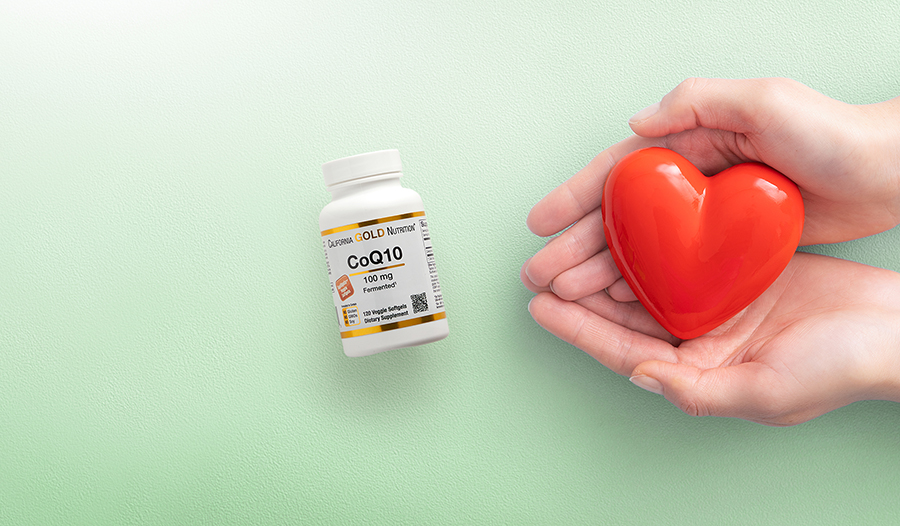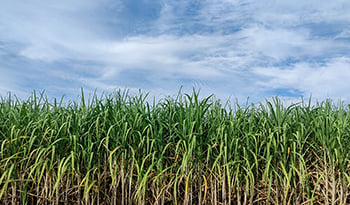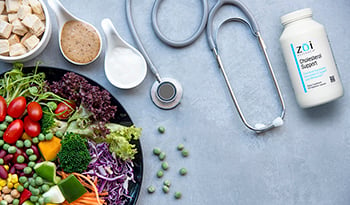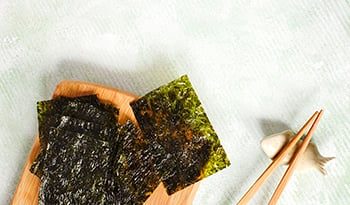5 Supplements to Support Heart Health and Blood Pressure
DISCLAIMER:This blog does not intend to provide diagnosis...
- In this article:
- What is High Blood Pressure?
- The Complications of High Blood Pressure
- 5 Blood Pressure Lowering Dietary Supplements

What is High Blood Pressure?
Your blood vessels and heart pump blood throughout your body by pressure gradients. Fluids, like water, tend to flow from areas of high pressure to low pressure areas. This principle works the same way in the body, where the vessels that carry blood away from your heart (arteries) have higher pressure than vessels that carry blood to your heart (veins). High blood pressure occurs when the pressure in the arteries elevates higher than considered normal. Narrow blood vessels will cause more resistance leading to higher pressure. Your heart will then continuously work harder to pump against a higher pressure. High blood pressure takes years to develop. Usually, you will not have any symptoms — hence why high blood pressure gets the nickname — the silent killer.
The Complications of High Blood Pressure
High blood pressure represents the leading factor of death and disability globally, including stroke, heart failure, chronic kidney disease, and death from heart disease. Family history and lifestyle choices can affect high blood pressure. These include high salt intake, obesity, excess alcohol consumption, medications like ibuprofen, stimulants, decongestants, and even illicit drugs. Diseases that affect other organs like the kidneys, adrenals, and thyroid gland can also lead to high blood pressure.
5 Blood Pressure Lowering Dietary Supplements
With high blood pressure, prevention remains critical. Many people can go undiagnosed with high blood pressure for many years since it often does not present any symptoms until it's too late. Thus, in addition to eating a healthy diet, supplements like folic acid, vitamin D, magnesium, CoQ10, and fiber may lower your blood pressure. Read on about these five blood pressure-lowering dietary supplements.
1. Folic Acid
Folic acid represents the synthetic form of folate, a type of B vitamin that helps the body make new cells. Low folate levels may contribute to increased cardiovascular risks, including high blood pressure. Several studies have shown that folic acid may help reduce high blood pressure by helping the walls of the arteries relax, leading to a lowered pressure. Folic acid supplementation decreased high blood pressure values by about 3% through the years — enough to counter the negative effects of this disease. Many fruits, vegetables, and grains contain folic acid. But with the average person taking only between 100 – 150 micrograms of folic acid a day, you should supplement to meet at least the recommended daily intake of 400 micrograms.
2. Vitamin D
The body makes vitamin D when exposed to sunlight. It helps us absorb calcium from our gut and helps with the immune system. Many individuals that live in colder climates suffer from lower vitamin D levels due to minimal sunlight exposure. If you work indoors for most of the day, this may also contribute to vitamin D deficiency. Vitamin D helps regulate blood pressure. It plays a vital role in regulating hormones produced by your kidneys that help manage how much salt you retain. Observational reports have noted higher blood pressure trends in the colder winter months, suggesting that lower vitamin D may contribute to higher blood pressure. Genetically modified mouse models have shown that vitamin D supported healthy blood pressure levels when these mice could not synthesize it themselves. Unfortunately, many human trials testing if vitamin D can prevent high blood pressure have yielded mixed results. These studies require more time and control of many more variables impractical in human studies. If you work primarily indoors or reside in areas with seasonal sunlight changes, consider supplementing with vitamin D. The recommended dose is 1,000 IU per day of vitamin D in healthy adults.
3. Magnesium
Magnesium can also help the arteries relax, leading to lower blood pressure, but it acts differently than garlic and folic acid. Consuming around 500 mg to 1000 mg of magnesium may lower blood pressure by 2-5 mmHg. Combining magnesium with foods high in potassium and low in sodium may have more efficacy in reducing blood pressure than just consuming magnesium supplements alone. Magnesium will come in many different formulations — one with taurine, which may be the most effective for supporting healthy blood pressure levels. On labels, this formulation will read magnesium taurate. This formulation allows for better absorption of magnesium and will reduce gastrointestinal side effects noted in other magnesium combinations. Magnesium citrate represents one of the most common formulations. But one of the side effects of this formulation presents with gastrointestinal discomfort since it helps with constipation. Magnesium glycinate represents a formulation that utilizes the amino acid (glycine) — found in many dietary supplements, and this formulation may help with sleep, anxiety, stress, and depression.
4. Fiber
Developed countries only consume about half the dietary fiber of the recommended 25-30 grams per day. A meta-analysis found that consuming dietary fiber may prevent hypertension. Much more needs to be studied on how fiber may lower high blood pressure. A high intake of dietary fiber helps reduce the glycemic index of foods, managing the insulin response that high glycemic meals may play in blood pressure regulation. More importantly, fiber intake may help absorb minerals like magnesium and vitamins like vitamin D and folic acid. The intake of dietary fiber may influence other heart-protecting measures like lowering cholesterols. Every gram of dietary fiber consumed resulted in a 2mg reduction in low-density lipoprotein (LDL cholesterol), the "bad" cholesterol. More importantly, higher intakes of dietary fiber have shown lower risks of type 2 diabetes.
5. Coenzyme Q10 (CoQ10)
CoQ10 is a powerful antioxidant molecule that is found in the powerhouse of the cell, the mitochondria. It helps convert food into energy. It also has the power to combat free radicals that can be found in your body. Your body can synthesize some of this molecule, but it is also obtained through the diet. CoQ10 is found in a variety of foods including, meats, fish, and nuts.
Having low levels of this powerful enzyme has been associated with conditions that affect the heart, nervous system, metabolism, and high blood pressure. CoQ10 may have the ability to relax the blood vessels that take blood away from the heart and thus may help in supporting healthy blood pressure levels. This is particularly important when it comes to taking this supplement and combining it with a healthy diet.
A recent Cochrane review showed mixed results in the use of only this supplement to help lower blood pressure. Larger randomized control trials are needed to determine if the blood-pressure-lowering effects reported are a combination of this supplement and healthy diets or contributed by other factors.
Recommended dosages for CoQ10 range from 30 mg to 200 mg per day. Many of the formulations of CoQ10 will be gel capsules, which are thought to be better absorbed than other formulations.
Remember, high blood pressure yields no symptoms most of the time. By eating a healthy diet with dietary supplements, you may be able to prevent high blood pressure. Keeping a healthy weight also prevents high blood pressure. Increasing physical activity offers a great way of keeping your weight in check while reducing stress and preventing high blood pressure.
Getting regular physical exams by your doctor will help prevent high blood pressure. So, if thinking about adding a supplement to your daily health routine, make sure to consult with your healthcare provider and introduce one at a time.
References:
- Corliss J. Folic acid, a B vitamin, lowers stroke risk in people with high blood pressure. Harvard Health Blog. https://www.health.harvard.edu/blog/folic-acid-a-b-vitamin-lowers-stroke-risk-in-people-with-high-blood-pressure-201503187810. Published June 24, 2020. Accessed January 24, 2021.
- Forman JP, Bischoff-Ferrari HA, Willett WC, Stampfer MJ, Curhan GC. Vitamin D Intake and Risk of Incident Hypertension. Hypertension. 2005;46(4):676-682. doi:10.1161/01.hyp.0000182662.82666.37
- Ho MJ, Li EC, Wright JM. Blood pressure lowering efficacy of coenzyme Q10 for primary hypertension. Cochrane Database Syst Rev. 2016;3(3):CD007435. Published 2016 Mar 3. doi:10.1002/14651858.CD007435.pub3
- Karen Shackelford MD. Get Info on the Effects That CoQ10 Can Have on Your Blood Pressure. Verywell Health. https://www.verywellhealth.com/improve-blood-pressure-with-coq10-supplements-4129265. Published November 21, 2019. Accessed January 27, 2021.
- McRae MP. High-dose folic acid supplementation effects on endothelial function and blood pressure in hypertensive patients: a meta-analysis of randomized controlled clinical trials. J Chiropr Med. 2009;8(1):15-24. doi:10.1016/j.jcm.2008.09.001
- Streppel MT. Dietary Fiber and Blood Pressure. Archives of Internal Medicine. 2005;165(2):150. doi:10.1001/archinte.165.2.150
- Terrie YC. The Important Role of Vitamin D. Pharmacy Times. https://www.pharmacytimes.com/publications/issue/2010/February2010/OTCFocusVitaminD-0210. Published February 15, 2010. Accessed January 24, 2021.
- Taler SJ. Initial Treatment of Hypertension. New England Journal of Medicine. 2018;378(7):636-644. doi:10.1056/nejmcp1613481
- Vaidya A, Williams JS. The relationship between vitamin D and the renin-angiotensin system in the pathophysiology of hypertension, kidney disease, and diabetes. Metabolism. 2012;61(4):450-458. doi:10.1016/j.metabol.2011.09.007

 By Dr. Gabriel Espinoza, M.D.
By Dr. Gabriel Espinoza, M.D.


